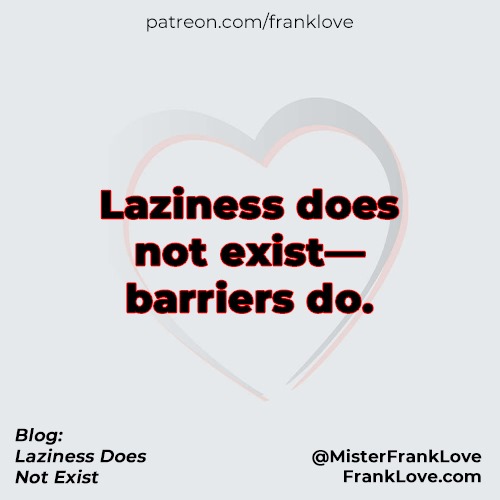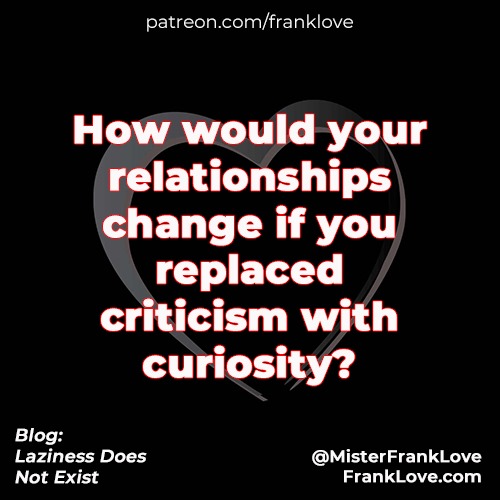 Understanding the context of human behavior leads to less criticism and more compassion.
Understanding the context of human behavior leads to less criticism and more compassion.
In my previous blog post, “I Work Too Hard,” we looked at organizing decision-making around intentional priorities rather than short-term fixes to empower ourselves to live more meaningful lives.
I am often amazed when I come upon someone who agrees with me. I was recently invited to Ghana to give a speech at AfroTalks. The presentation was titled, “What Is Love?.” During this speech (minute 9:04 to 10:08), I discussed how I was not curious about my first wife. I wasn’t curious about her processing or her challenges, etc. That lack of curiosity was fodder for me to write her off and dismiss any of her behaviors that I labeled as absurd or ludicrous; instead of making sustained efforts to work with her and through any challenges. I was not a good husband.
In my internet browsing, I recently came upon an article that supported the importance of being curious about the people in our world.
The Myth of Laziness
Lazy. It is a word many of us throw around when we or people close to us fail to meet expectations. We use it to explain missed deadlines, procrastination, or even unwashed dishes in the sink. But as social psychologist Devon Price argues in their powerful essay Laziness Does Not Exist, laziness is not real. What we call laziness is almost always an unseen barrier, obstacle, fear, or unmet need that prevents someone from acting.
When we brand someone as lazy, we oversimplify the complexity of human behavior. We ignore the fact that every action or inaction comes with a context. If we shift our perspective, it does not just make us more compassionate educators, leaders, or partners. It makes us better humans.
Barriers, Not Moral Failures
Price explains that procrastination and other so-called lazy behaviors are rarely the result of weak willpower. Instead, they are the product of barriers like anxiety, depression, executive functioning challenges, or overwhelming life circumstances. A person who struggles to turn in a paper on time is not choosing irresponsibility. More often than not, they are battling fear of failure, uncertainty about where to begin, or exhaustion from life’s demands.
I was struck by Price’s insistence that “there are always barriers.” Recognizing those barriers and treating them as legitimate is the first step toward meaningful support. Rather than dismissing a person’s behavior as lazy, we should be curious about what is standing in their way.
Curiosity over Judgment
That is where curiosity enters the conversation. In my own work and reflections, I have emphasized the importance of curiosity in relationships. Instead of reacting with frustration when our partner or colleague falls short, what if we asked, “What is holding you back?”
Price puts it simply: “If a person’s behavior doesn’t make sense to you, it is because you are missing a part of their context.”
Think about how different our relationships could look if we approached each other with curiosity rather than judgment. Instead of assuming our partner is careless or unmotivated, we might uncover that they are struggling with stress at work, feelings of inadequacy, or even depression. That shift changes everything; it turns resentment to empathy, conflict to connection.
Lessons from the Classroom and Beyond
Price illustrates this point with stories from his time as a professor. He describes students who missed class or failed to turn in assignments and how his colleagues often labeled them as lazy. But when Price dug deeper, the truth was different. One student was managing serious mental health treatment, another was processing trauma, and yet another was living with obsessive-compulsive disorder. These were not lazy people. They were people carrying unseen burdens.
This truth extends beyond the classroom. In the workplace, an employee who misses deadlines may not be unmotivated. They may be overwhelmed by caregiving responsibilities, unclear expectations, or untreated anxiety. In our families, a loved one who seems disengaged may not be apathetic. They may be struggling silently.
When we reframe behavior through curiosity, we open the door to understanding and meaningful support.
Relationships and “Lazy” Love
In our intimate partnership, the temptation to label is just as strong. We might not call our partner lazy, but we certainly call them other things: irresponsible, inattentive, selfish. Yet the principle remains the same. Behind every frustrating action or inaction is a reason.
Maybe our partner does not initiate date nights, not because they do not care, but because they feel anxious about planning something we will enjoy. Maybe they avoid hard conversations, not because they do not value the relationship, but because conflict triggers old wounds. By choosing curiosity over judgment, we transform criticism into compassion.
This does not mean we ignore harmful behaviors or excuse everything. It means we stop labeling people in ways that shut down dialogue. Instead, we investigate together: What is really going on here? How can I support you in moving past this barrier?
Choosing to Look Harder
Price ends his essay with a challenge: “Look harder.” If all you see is laziness, you are missing something. There is always an explanation, always a barrier, always a context that makes sense of what seems irrational.
This mindset could be powerful in our communities, workplaces, and homes. What if, instead of leaping to judgment, we leaned into curiosity? What if we treated unseen barriers as legitimate and worthy of compassion? What if we chose to see our partner, colleagues, and students as whole people, not as labels?
The myth of laziness keeps us from connecting with others at their most human level. People do not choose to fail or disappoint. They want to do well. They are trying. And when we look harder, with curiosity and empathy, we give them the chance to thrive. And that’s loving.
Keep Rising,
Frank Love
Watch my video Laziness Does Not Exist To Related to this blog.
Watch Frank Love’s presentation “The Act of Caring.”
Subscribe to receive Frank’s weekly blog.
Become a sponsor of Frank Love and his work creating a loving cultures in our relationships with a monthly contribution of as little as $2. Sign up today at Patreon,com/FrankLove.
– – – – – – – – – – – – – – – – – – – – – – – – – – – – – – – – – –
Each week, Frank Love hosts Zoom support group meetings that assist women and men as we work to create a loving culture in our relationships. Calls occur from 7:00 p.m. to 8:30 p.m. EST and can be accessed by visiting FrankWeeklyCall.com.
- Tuesdays – Black Women: Creating a Loving Culture in Our Relationships
- Thursdays – Black Men: Creating a Loving Culture in Our Relationships
– – – – – – – – – – – – – – – – – – – – – – – – – – – – – – – – – –
Frank Love coaches individuals who are in (or wish to be in) a relationship toward creating a loving culture in their family. He is also the author of Relationship Conversations You Don’t Want to Have (But Should Anyway) and 25 Ways to Be Loving. To schedule a free consultation, contact Frank at Frank@FrankLove.com.

